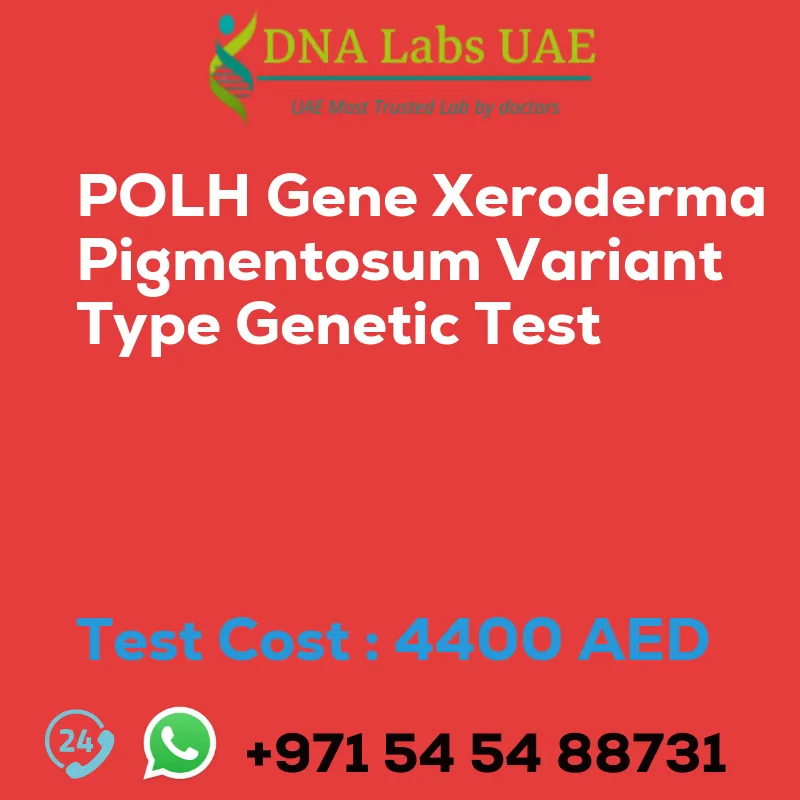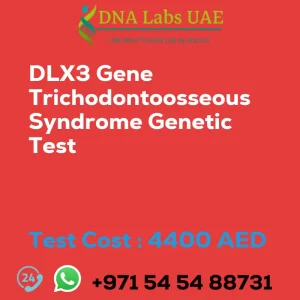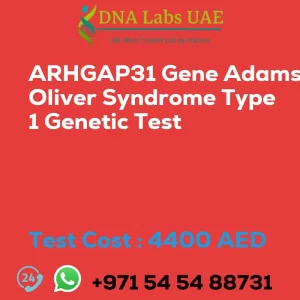POLH Gene Xeroderma pigmentosum variant type Genetic Test
Test Name: POLH Gene Xeroderma pigmentosum variant type Genetic Test
Components: DNA Labs UAE offers this test at a price of 4400.0 AED
Sample Condition: Blood or Extracted DNA or One drop Blood on FTA Card
Report Delivery: 3 to 4 Weeks
Method: NGS Technology
Test Type: Osteology Dermatology Immunology Disorders
Doctor: Dermatologist
Test Department: Genetics
Pre Test Information: Before undergoing the POLH Gene Xeroderma pigmentosum variant type Genetic Test, it is important to provide the clinical history of the patient. A Genetic Counselling session may also be conducted to draw a pedigree chart of family members affected with POLH Gene Xeroderma pigmentosum, variant type NGS Genetic DNA Test gene POLH.
Test Details: The POLH gene is associated with xeroderma pigmentosum, variant type, a rare genetic disorder characterized by extreme sensitivity to UV light and an increased risk of developing skin cancer. NGS, or Next-Generation Sequencing, is a high-throughput DNA sequencing technology used in this genetic test. It analyzes the DNA sequence of specific genes to identify variations or mutations associated with xeroderma pigmentosum, variant type. This test helps confirm a diagnosis and provides information about the specific genetic changes present. It is typically performed in specialized laboratories and should be ordered and interpreted by a healthcare professional with expertise in genetics.
Who Should Consider This Test: Genetic testing for xeroderma pigmentosum, variant type is recommended for individuals with symptoms suggestive of the condition or a family history of the disorder. It can also be used for carrier testing in individuals with a family history of the condition to determine if they carry a mutation in the POLH gene.
Importance of Genetic Testing: Genetic testing for xeroderma pigmentosum, variant type provides valuable information for diagnosis, management, and genetic counseling. The results of the test can help healthcare professionals make informed decisions about treatment options and provide appropriate guidance to patients and their families.
| Test Name | POLH Gene Xeroderma pigmentosum variant type Genetic Test |
|---|---|
| Components | |
| Price | 4400.0 AED |
| Sample Condition | Blood or Extracted DNA or One drop Blood on FTA Card |
| Report Delivery | 3 to 4 Weeks |
| Method | NGS Technology |
| Test type | Osteology Dermatology Immunology Disorders |
| Doctor | Dermatologist |
| Test Department: | Genetics |
| Pre Test Information | Clinical History of Patient who is going for POLH Gene Xeroderma pigmentosum, variant type NGS Genetic DNA Test. A Genetic Counselling session to draw a pedigree chart of family members affected with POLH Gene Xeroderma pigmentosum, variant type NGS Genetic DNA Test gene POLH |
| Test Details |
The POLH gene is associated with a condition called xeroderma pigmentosum, variant type. Xeroderma pigmentosum is a rare genetic disorder characterized by extreme sensitivity to ultraviolet (UV) light from the sun and an increased risk of developing skin cancer. NGS stands for Next-Generation Sequencing, which is a high-throughput DNA sequencing technology that allows for the simultaneous sequencing of many DNA fragments. NGS genetic testing involves analyzing the DNA sequence of specific genes to identify any variations or mutations that may be present. The NGS genetic test for the POLH gene can be used to identify mutations or variations in the gene that are associated with xeroderma pigmentosum, variant type. This test can help confirm a diagnosis of the condition and provide information about the specific genetic changes that are present. Genetic testing for xeroderma pigmentosum, variant type can be helpful for individuals who have symptoms suggestive of the condition or a family history of the disorder. It can also be used for carrier testing in individuals with a family history of the condition to determine if they carry a mutation in the POLH gene. It is important to note that genetic testing for xeroderma pigmentosum, variant type is typically performed in specialized laboratories and should be ordered and interpreted by a healthcare professional with expertise in genetics. The results of the test can provide valuable information for diagnosis, management, and genetic counseling. |








